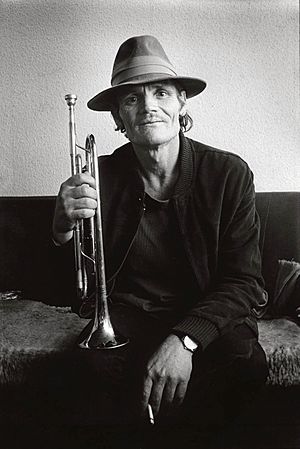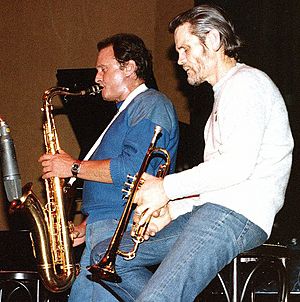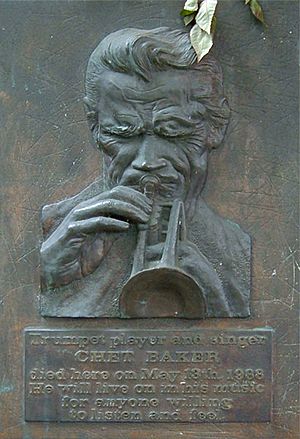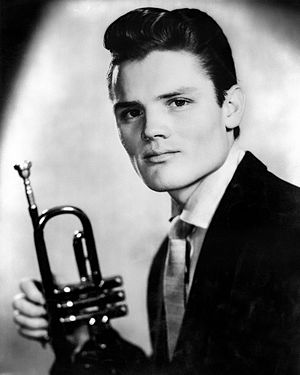Chet Baker facts for kids
Quick facts for kids
Chet Baker
|
|
|---|---|

Chet Baker in 1983
|
|
| Background information | |
| Birth name | Chesney Henry Baker |
| Born | December 23, 1929 Yale, Oklahoma, U.S. |
| Died | May 13, 1988 (aged 58) Amsterdam, Netherlands |
| Genres | Cool jazz, bebop, West Coast jazz |
| Occupations | Musician, singer, composer |
| Instruments | Trumpet, flugelhorn, vocals, piano |
| Years active | 1949–1988 |
| Labels | Pacific Jazz, RCA, Epic |
| Associated acts | Gerry Mulligan, Art Pepper, Stan Getz, Charlie Parker, Russ Freeman, Bud Shank |
Chesney Henry "Chet" Baker Jr. (December 23, 1929 – May 13, 1988) was an American jazz trumpeter and vocalist. He is known for major innovations in cool jazz that led him to be nicknamed the "Prince of Cool".
Baker earned much attention and critical praise through the 1950s, particularly for albums featuring his vocals: Chet Baker Sings (1954) and It Could Happen to You (1958). Jazz historian Dave Gelly described the promise of Baker's early career as "James Dean, Sinatra, and Bix, rolled into one". Baker was in and out of jail frequently before enjoying a career resurgence in the late 1970s and 1980s.
Contents
Biography
Early years
Baker was born and raised in a musical household in Yale, Oklahoma, on December 23, 1929. His father, Chesney Baker Sr., was a professional guitarist, and his mother, Vera Moser, was a pianist who worked in a perfume factory. His maternal grandmother was Norwegian. Baker said that owing to the Great Depression, his father, though talented, had to quit as a musician and take a regular job. In 1940, when Baker was 10, his family relocated to Glendale, California.
Baker began his musical career singing in a church choir. His father gave him a trombone, which was replaced with a trumpet when the trombone proved too large. His mother said that he had begun to memorize tunes on the radio before he was given an instrument. After "falling in love" with the trumpet, he improved noticeably in two weeks. Peers called Baker a natural musician to whom playing came effortlessly.
Baker received some musical education at Glendale High School, but he left school at the age of 16 in 1946 to join the United States Army. He was assigned to Berlin, Germany, where he joined the 298th Army Band. After leaving the Army in 1948, he studied music theory and harmony at El Camino College in Los Angeles. He dropped out during his second year to re-enlist. He became a member of the Sixth Army Band at the Presidio in San Francisco, spending time in clubs such as Bop City and the Black Hawk. He was discharged from the Army in 1951 and proceeded to pursue a career in music.
Career
Baker performed with Vido Musso and Stan Getz before being chosen by Charlie Parker for a series of West Coast engagements.
In 1952, Baker joined the Gerry Mulligan Quartet and attracted considerable attention. Rather than playing identical melody lines in unison like Parker and Dizzy Gillespie, Baker and Mulligan complemented each other with counterpoint and anticipating what the other would play next. "My Funny Valentine," with a solo by Baker, became a hit and was associated with Baker for the rest of his career. With the quartet, Baker was a regular performer at Los Angeles jazz clubs such as The Haig and the Tiffany Club.
Within a year, Mulligan was arrested and imprisoned. Baker formed a quartet with a rotation that included pianist Russ Freeman, bassists Bob Whitlock, Carson Smith, Joe Mondragon, and Jimmy Bond, and drummers Larry Bunker, Bob Neel, and Shelly Manne. Baker's quartet released popular albums between 1953 and 1956. Baker won reader's polls at Metronome and DownBeat magazines, beating trumpeters Miles Davis and Clifford Brown. In 1954, readers named Baker the top jazz vocalist. In 1954, Pacific Jazz Records released Chet Baker Sings, an album that increased his visibility and drew criticism. Nevertheless, Baker sang throughout the rest of his career.
Hollywood studios saw an opportunity in Baker's chiseled features. He made his acting debut in the film Hell's Horizon, released in the fall of 1955. He declined a studio contract, preferring life on the road as a musician. Over the next few years, Baker led his own combos, including a 1955 quintet with Francy Boland, where Baker combined playing trumpet and singing. In 1956, he completed an eight-month tour of Europe, where he recorded Chet Baker in Europe.
In late 1959, he returned to Europe, recording in Italy what became known as the Milano sessions, with arranger and conductor Ezio Leoni (Len Mercer) and his orchestra. Baker was arrested and jailed in Lucca, forcing Leoni to communicate through the prison warden to coordinate arrangements with Baker as they prepared for recording.
During most of the 1960s, Baker played flugelhorn, and recorded music that could be classified as West Coast jazz.
He appeared in 1960 in the Italian film Howlers in the Dock. He also played himself in the 1963 British film Stolen Hours.
Comeback

After developing a new embouchure resulting from dentures, Baker returned to the straight-ahead jazz that began his career. He moved to New York City and began performing and recording again, including with guitarist Jim Hall. Baker returned to Europe in the 1970s where his friend, Diane Vavra, with whom he had an on-again, off-again relationship since 1970, accompanied him and remained with him during his last years of life. She went on to take care of his day-to-day needs, helping him with personal care as well as with his recording and performance work.
Close to the end of Baker's life, he stayed and worked almost exclusively in Europe, only returning to the U.S. about once a year to attend some performances.
In 1983, British singer Elvis Costello, a longtime fan of Baker, hired the trumpeter to play a solo on his song "Shipbuilding" for the album Punch the Clock. The song exposed Baker's music to a new audience. Later, Baker often featured Costello's song "Almost Blue" (inspired by Baker's version of Ray Henderson's “The Thrill Is Gone", not to be confused with the Roy Hawkins song of the same name, made famous by B.B. King) in his concert sets, and recorded the song for Let's Get Lost.
In 1986, Chet Baker: Live at Ronnie Scott's London presented Baker in an intimate stage performance filmed with Elvis Costello and Van Morrison as he performed a set of standards and classics, including "Just Friends", "My Ideal", and "Shifting Down". Augmenting the music, Baker spoke one-on-one with friend and colleague Costello about his childhood and career.
Baker recorded the live album Chet Baker in Tokyo with his quartet featuring pianist Harold Danko, bassist Hein Van de Geyn, and drummer John Engels less than a year before his death, and it was released posthumously. Silent Nights, a recording of Christmas music, was recorded in New Orleans, Louisiana, with saxophonist Christopher Mason, pianist Michael Pellera, bass player James Singleton, and drummer Johnny Vidacovich in 1986 and released in 1987.
In 2006, Jazz Icons: Chet Baker: Live in '64 & '79 was released, featuring two European concerts filmed 15 years apart. The 1964 performance took place in a Belgian TV studio, and the 1979 set was recorded in Norway. Other musicians featured are saxophonist Jacques Pelzer, French pianist René Urtreger, and vibraphonist Wolfgang Lackerschmid. Songs include the Miles Davis classic "So What", the jazz standard "Time After Time", "Blue Train", and many others.
Death

Early on May 13, 1988, Baker was found dead on the street below his room in Hotel Prins Hendrik, Amsterdam. No evidence of a struggle was found, and the death was ruled an accident. A plaque was placed outside the hotel in his memory.
Baker is buried at the Inglewood Park Cemetery in Inglewood, California, next to his father.
Personal life
Baker was married three times, to Charlaine Souder, Halema Alli, and Carol Jackson. He had four children: Chesney III with Halema; and Dean, Paul, and Melissa with Carol. Ruth Young was Baker's common-law wife from 1973 to the time of his death in 1988. Baker was fluent in Italian.
Compositions
Some of Baker's notable compositions include "Chetty's Lullaby", "Freeway", "Early Morning Mood", "Two a Day", "So che ti perderò" ("I Know I Will Lose You"), "Il mio domani" ("My Tomorrow"), "Motivo su raggio di luna" ("Contemplate on a Moonbeam"), "The Route", "Skidaddlin'", "New Morning Blues" (with Duke Jordan), "Blue Gilles", "Dessert", "Anticipated Blues", "Blues for a Reason", "We Know It's Love", and "Looking Good Tonight".
Legacy
Baker was photographed by William Claxton for his book Young Chet: The Young Chet Baker. An Academy Award-nominated 1988 documentary about Baker, Let's Get Lost, portrays him as a cultural icon of the 1950s. The film, directed by fashion photographer Bruce Weber, was shot in black-and-white, and includes a series of interviews with friends, family (including his three children by third wife Carol Baker), musical associates, and female friends, interspersed with footage from Baker's earlier life, and interviews with Baker in his last years. In Chet Baker, His Life and Music, author Jeroen de Valk and others criticize the film for presenting Baker as a "washed-up" musician in his later years. The film was shot during the first half of 1987, prior to career highlights such as the Japanese concert, released on Chet Baker in Tokyo. It premiered four months after Baker's death.
Time after Time: The Chet Baker Project, written by playwright James O'Reilly, toured Canada in 2001.
Jeroen de Valk has written a biography of Baker; Chet Baker: His Life and Music is the English translation. Other biographies of him include James Gavin's Deep in a Dream—The Long Night of Chet Baker, and Matthew Ruddick's Funny Valentine. Baker's "lost memoirs" are available in the book As Though I Had Wings, which includes an introduction by Carol Baker.
Chet Baker is portrayed by Ethan Hawke in the 2015 film Born to Be Blue. It is a reimagining of Baker's career in the late 1960s, when he is famous for both his music and his addiction, and he takes part in a movie about his life to boost his career. Steve Wall plays Baker in the 2018 film My Foolish Heart.
American singer/songwriter David Wilcox included the tender biographical portrait Chet Baker's Unsung Swan Song on his 1991 album Home Again. Vocalist Luciana Souza recorded The Book of Chet in 2012 as a tribute. Brazilian jazz pianist Eliane Elias dedicated her 2013 album I Thought About You to Chet Baker.
Australian musician Nick Murphy chose "Chet Faker" as his stage name as a tribute to Baker. Murphy said, "I listened to a lot of jazz and I was a big fan of ... the way he sang, when he moved into mainstream singing. He had this really fragile vocal style—this really, broken, close-up, and intimate style. The name is kind of just an ode to Chet Baker and the mood of music he used to play—something I would like to at least pay homage to in my own music."
Awards and honors
- Big Band and Jazz Hall of Fame induction, 1987
- DownBeat magazine Jazz Hall of Fame, 1989
- Oklahoma Jazz Hall of Fame, 1991
- Grammy Hall of Fame Award for Chet Baker Sings (1956), inducted 2001
- Chet Baker Day proclaimed by Oklahoma Governor Brad Henry and the Oklahoma House of Representatives, 2005
- Chet Baker Jazz Festival in his honor in Yale, Oklahoma, October 10, 2015
- Forlì Jazz Festival in honor of Chet Baker (30 years after his death), in Forlì, Italy, May 2–19, 2018
Discography
Filmography
- (1955) Hell's Horizon, by Tom Gries: actor
- (1959) Audace colpo dei soliti ignoti, by Nanni Loy: music
- (1960) Howlers in the Dock, by Lucio Fulci: actor
- (1963) Ore rubate ["stolen hours"], by Daniel Petrie: music
- (1963) Tromba Fredda, by Enzo Nasso: actor and music
- (1963) Le concerto de la peur, by José Bénazéraf: music
- (1964) L'enfer dans la peau, by José Bénazéraf: music
- (1964) Nudi per vivere, by Elio Petri, Giuliano Montaldo and Giulio Questi: music
- (1988) Let's Get Lost, by Bruce Weber: music
See also
 In Spanish: Chet Baker para niños
In Spanish: Chet Baker para niños


